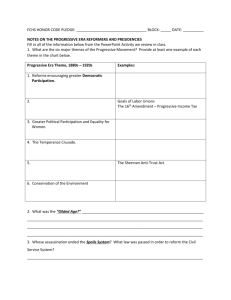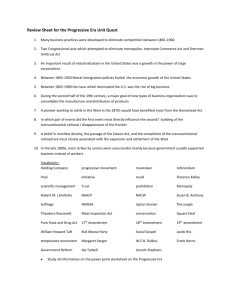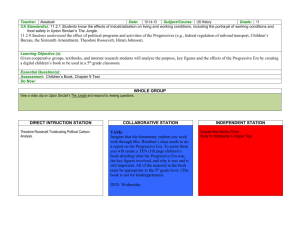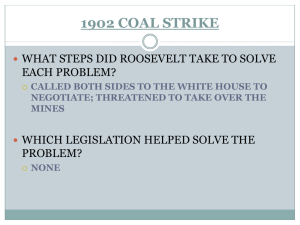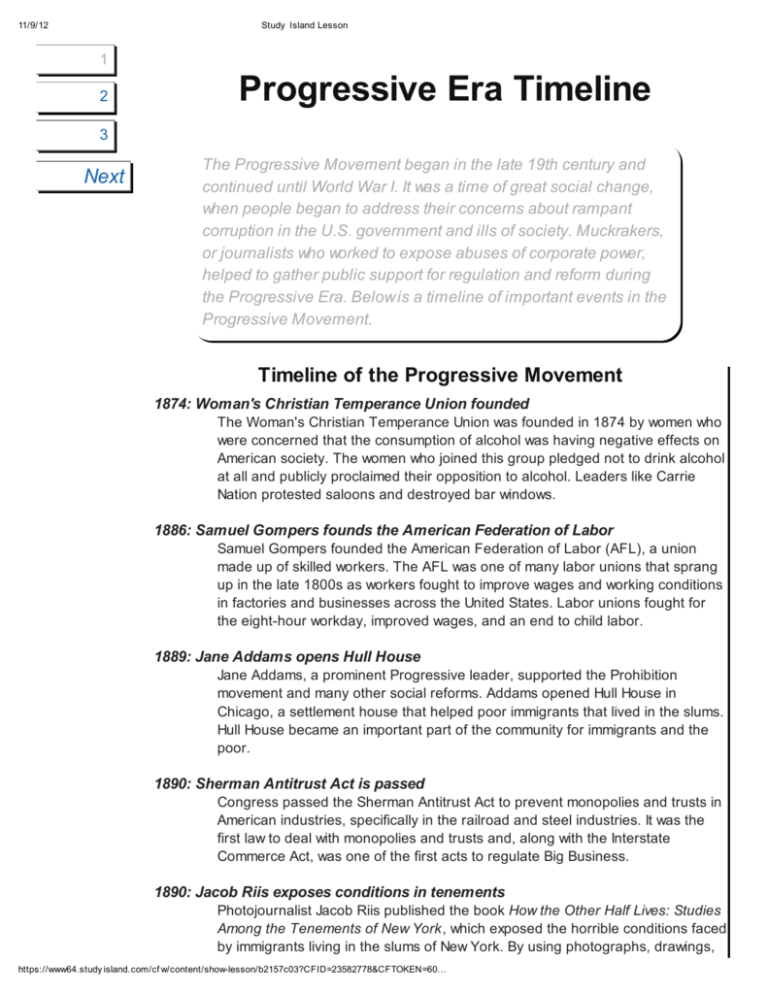
11/9/12
Study Island Lesson
1
2
Progressive Era Timeline
3
Next
The Progressive Movement began in the late 19th century and
continued until World War I. It was a time of great social change,
when people began to address their concerns about rampant
corruption in the U.S. government and ills of society. Muckrakers,
or journalists who worked to expose abuses of corporate power,
helped to gather public support for regulation and reform during
the Progressive Era. Below is a timeline of important events in the
Progressive Movement.
Timeline of the Progressive Movement
1874: Woman's Christian Temperance Union founded
The Woman's Christian Temperance Union was founded in 1874 by women who
were concerned that the consumption of alcohol was having negative effects on
American society. The women who joined this group pledged not to drink alcohol
at all and publicly proclaimed their opposition to alcohol. Leaders like Carrie
Nation protested saloons and destroyed bar windows.
1886: Samuel Gompers founds the American Federation of Labor
Samuel Gompers founded the American Federation of Labor (AFL), a union
made up of skilled workers. The AFL was one of many labor unions that sprang
up in the late 1800s as workers fought to improve wages and working conditions
in factories and businesses across the United States. Labor unions fought for
the eight-hour workday, improved wages, and an end to child labor.
1889: Jane Addams opens Hull House
Jane Addams, a prominent Progressive leader, supported the Prohibition
movement and many other social reforms. Addams opened Hull House in
Chicago, a settlement house that helped poor immigrants that lived in the slums.
Hull House became an important part of the community for immigrants and the
poor.
1890: Sherman Antitrust Act is passed
Congress passed the Sherman Antitrust Act to prevent monopolies and trusts in
American industries, specifically in the railroad and steel industries. It was the
first law to deal with monopolies and trusts and, along with the Interstate
Commerce Act, was one of the first acts to regulate Big Business.
1890: Jacob Riis exposes conditions in tenements
Photojournalist Jacob Riis published the book How the Other Half Lives: Studies
Among the Tenements of New York, which exposed the horrible conditions faced
by immigrants living in the slums of New York. By using photographs, drawings,
https://www64.study island.com/cf w/content/show-lesson/b2157c03?CFID=23582778&CFTOKEN=60…
11/9/12
Study Island Lesson
and written descriptions, Riis's book included images of sweatshops, child labor,
and overcrowded and unsanitary tenements. Riis used his book to advocate
social reform.
1892: Sierra Club is founded
The Sierra Club was founded in 1892 by John Muir as an environmental
organization. The goals of the group were defined as protection of the
wilderness, the responsible use of natural resources, and education regarding
the benefits of conservation.
1892: Homestead Strike
The Homestead Strike took place in 1892 when iron and steel workers who
belonged to the Amalgamated Association of Iron and Steel Workers struck the
Carnegie Steel Company in Homestead, Pennsylvania, to protest a proposed
wage cut. The company's manager hired 300 Pinkerton detectives to protect the
plant and the strikebreakers who were still working. In an armed battle between
the workers and the detectives, several men were killed or wounded. The
governor called out the state militia, and the nonunion workers stayed on the
job, ending the strike.
1895: U.S. v. E.C. Knight & Co goes to Supreme Court
In 1892, the American Sugar Refining Company acquired the E.C. Knight
Company, creating a 98% monopoly of the American sugar refining industry.
The U.S. government sued the E.C. Knight Company, arguing that this monopoly
violated the Sherman Antitrust Act. The Supreme Court ruled the manufacturing
of sugar could not be regulated by Congress because it was a local activity.
1900: Carrie Chapman Catt becomes president of the National American
Women's Suffrage Association
Carrie Chapman Catt was a notable leader of women's suffrage. She was the
president of the National American Women's Suffrage Association in 1900-1904,
and again from 1915-1920. Because of the efforts of Catt and other suffragists,
women finally gained the right to vote in 1920.
1901: Theodore Roosevelt becomes president
Theodore Roosevelt supported many progressive reforms. He was also a strong
supporter of the conservation movement. He expanded the amount of land that
was used for national parks and national forests. He realized that natural
resources, especially forests, needed to be managed in a way so that they
would not be depleted. Roosevelt also worked to ensure that ordinary citizens
got a "square deal." He did not want people to be mistreated by big
corporations. He supported government regulations of the railroad industry, and
he expanded the government's role in protecting consumers.
1902: Anthracite Coal Strike occurs
In May, coal workers in Pennsylvania's anthracite fields struck, demanding
higher wages, union recognition, and an eight-hour workday. Anthracite coal
was necessary for heating homes. President Theodore Roosevelt met with coal
workers in October, five months after the strike began, to help resolve the strike.
It was the first time the president personally intervened in a labor dispute. During
https://www64.study island.com/cf w/content/show-lesson/b2157c03?CFID=23582778&CFTOKEN=60…
2/5
11/9/12
Study Island Lesson
President Theodore Roosevelt's administration, the government played a more
active role in regulating Big Business and was able to use its power in a more
effective manner.
1902: Beginning of Election Reform
Many progressives sought to reform U.S. politics to give citizens more direct
power over the government in order to circumvent political bosses or corruption.
In 1902, voters in Oregon approved a ballot measure that created the initiative
and referendum processes for citizens to directly introduce or approve proposed
laws or amendments to the state constitution, making Oregon the first state to
adopt such a system. These measures were further expanded in 1908 with the
passage of an amendment giving voters the power to recall elected officials and
the popular election of U.S. Senators. In 1911, California governor Hiram
Johnson established the Oregon System of "Initiative, Referendum, and Recall"
in his state, viewing them as good influences for citizen participation against the
historic influence of large corporations on state lawmakers. These Progressive
reforms were soon replicated in other states, including Idaho, Washington, and
Wisconsin.
1904: Muckraker Ida Tarbell writes The History of the Standard Oil Company
Beginning her research into the company in 1900, Tarbell pieced together public
documents from across the country to find instances of Standard Oil's
aggressive approach to putting down its rivals. Organized into a coherent
history, these documents became a stark portrayal of the company's policies
and of big business in general. As a result, Standard Oil was exposed as a
monopoly, and Tarbell's work eventually led to the breakup of the company.
1904: Northern Securities v. U.S. goes to Supreme Court
In 1904, the U.S. sued Northern Securities Company, a holding company made
up of several railroad companies. The U.S. argued that Northern Securities
violated the Sherman Antitrust Act. The Supreme Court ruled that Northern
Securities was in violation of the act and ordered the company to break up. This
marked a change to a more aggressive enforcement of the Sherman Antitrust
Act than in earlier court cases.
1906: Meat Inspection Act and Pure Food and Drug Act are passed
The Meat Inspection Act set sanitary standards for the meat-packing industry. It
was passed the same year that Upton Sinclair's book The Jungle was published,
as The Jungle had gained the country's attention over the poor conditions in
slaughterhouses. The Pure Food and Drug Act, which required merchants to
label their food and drugs correctly, was passed during the same time.
1909: Payne-Aldrich Tariff is passed
This act, passed during a special session of Congress called by President Taft,
was the first change in tariff laws since 1897. The tariff changed over 650 tariff
schedules, but it was not as aggressive as some members of Congress had
hoped.
1910: Mann-Elkins Act is passed
Congress passed this act to strengthen the Interstate Commerce Act, which
https://www64.study island.com/cf w/content/show-lesson/b2157c03?CFID=23582778&CFTOKEN=60…
3/5
11/9/12
Study Island Lesson
required railroad rates to be "reasonable and just." The law did not specify what
"reasonable and just" meant, so the act was not effective in regulating rates.
Under the Mann-Elkins Act, railroad companies were required to prove that their
rates were reasonable.
1911: American Tobacco v. U.S. goes to Supreme Court
The U.S. sued the American Tobacco Company in 1911 for violating the
Sherman Antitrust Act. It was the first case brought against a tobacco company.
American Tobacco was found in violation of the Sherman Antitrust Act by the
Supreme Court and broke up into several major companies.
1911: Triangle Shirtwaist Factory Fire
A fire broke out at the Triangle Shirtwaist Factory in New York City resulting in
the death of 146 garment workers who were unable to escape from the upper
floors of the building. The fire had spread quickly because of the flammable
textiles that were located throughout the factory. Workers were unable to escape
because doors had been locked to prevent workers from stealing materials. Fire
ladders were not tall enough to reach the trapped workers on the upper floors.
The Triangle Shirtwaist Factory fire brought attention to the unsafe conditions
that many workers faced in sweatshops. The International Ladies' Garment
Workers Union began advocating reforms to improve working conditions for the
garment industry, which led to new safety regulations.
1912: Woodrow Wilson is elected president of the U.S.
In 1912, the Progressive Party entered the presidential race. First, Robert La
Follette tried to win the Republican nomination with his platform of progressivism.
La Follette was a Wisconsin governor who advocated for the direct primary
election and for income tax reform. Theodore Roosevelt, former president and
another progressive, received more support than La Follette and also tried to
win the Republican nomination. The Republicans renominated President Taft,
and so progressive Republicans who supported Roosevelt formed the
Progressive Party, also known as the Bull Moose Party, and nominated
Roosevelt for president. Woodrow Wilson was the nominee from the Democratic
Party. He had successfully passed several progressive reforms as governor of
New Jersey, and he promised a series of reforms he called the New Freedom.
Woodrow Wilson defeated Theodore Roosevelt, William Howard Taft, and
Eugene Debs and won the election.
1913: 16th, 17th Amendments Ratified
In 1913, both the 16th and 17th Amendments were ratified. The 16th
Amendment created a federal income tax. The 17th Amendment changed how
senators were elected. It gave the people the power to elect senators in direct
elections, rather than having senators appointed by state legislatures.
1913: Federal Reserve Act is passed
Congress passed the Federal Reserve Act in 1913, which created 12 regional
Federal Reserve banks to be supervised by a Federal Reserve Board. The
Federal Reserve System is the central banking system of the United States, and
it is still in existence today.
https://www64.study island.com/cf w/content/show-lesson/b2157c03?CFID=23582778&CFTOKEN=60…
4/5
1914: Clayton Antitrust Act is passed
Congress passed the Clayton Antitrust Act to act as an amendment to the
Sherman Antitrust Act. This act prohibits exclusive sales contracts, local price
cutting (to freeze out competitors), and interlocking directorates in corporations
with capital of $1 million or more. This act was used to clarify the Sherman
Antitrust Act.
1916: Alice Paul forms the National Women's Party
Alice Paul was a suffragist leader in the early twentieth century. She formed the
National Women's Party in 1916, which worked hard to gain a constitutional
amendment allowing women the right to vote. She was well known for leading
protests and hunger strikes.
1919: 18th Amendment is passed
Due to pressures from members of the Temperance Movement, many state
governments passed state-wide prohibition in the early 1900s. Responding to
this growing support, Congress passed a resolution in 1917 regarding nationwide prohibition to be presented to the states for ratification. The 18th
Amendment was ratified on January 16, 1919, banning the manufacture,
transportation, and sale of alcohol. This began the Prohibition Era, which lasted
until the passage of 21st Amendment in 1933.
1920: 19th Amendment is passed
In 1920, Congress passed the 19th Amendment, which gave women the right to
vote. This amendment gave all women who were citizens of the United States the
right to vote in local, state, and federal elections in the U.S.
Comment on Lesson
Copyright © 2012 Study Island - All rights reserved.

